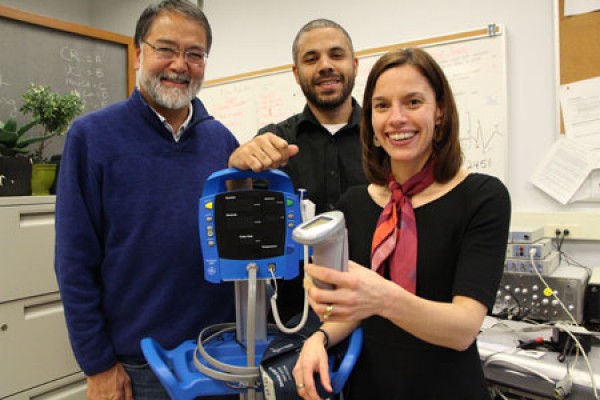 From left, kinesiology researchers Kenji Kenno, Kevin Milne and Cheri McGowan check out one of the isometric handgrip devices they'll use for their research.
From left, kinesiology researchers Kenji Kenno, Kevin Milne and Cheri McGowan check out one of the isometric handgrip devices they'll use for their research.
Hypertension has been described by the World Health Organization as a global health crisis, but a trio of kinesiology researchers is aiming to change that by determining how the simple act of squeezing a small hand-held device can lower blood pressure.
Cheri McGowan, Kevin Milne (BHK 1999) and Kenji Kenno (MHK 1977) have received a grant from the university’s research stimulus fund to study the effects of isometric hand-grip training on people with elevated blood pressure.
Previous studies with small sample sizes have shown it’s effective and the American Heart Association has endorsed hand-grip training as an alternative measure to help lower blood pressure, but more research is still required, according to Dr. McGowan.
“Clinicians need to have some questions answered before they’ll actually begin prescribing hand grips as an alternative,” she said.
McGowan said there’s a lack of information about the impact of hand-grip training on 24-hour ambulatory blood pressure – a better predictor of cardiovascular disease – as well as dose requirements, and the persistence of the effect if training stops.
The team will apply to the Research Ethics Board, and once cleared, will begin recruiting 95 patients whose blood pressure is above 140/90 and are on medication to treat it. They’ll divide the participants in to five groups that will do hand grip training with varying regularity and frequency over a 16-week period.
The mandate of the research stimulus fund is to build upon research strengths, enhance future research funding, especially from the tri-council, and enhance graduate training and experiential learning. McGowan said the funding will allow them to expand the scope of their research.
“This should give us the opportunity to collect substantial data so we can apply for larger multi-site trials and collect even better data,” she said. “Ultimately it’s about improving the standard of care for patients with high blood pressure.”
Dr. Kenno said about half of the people in North America who take blood pressure medication are seeing their numbers lowered, but not to the level they should be.
“One of the things we’re trying to avoid is more medication,” he said. “If we can reduce the amount of drugs people need to take to improve their blood pressure, then all the better for them.”
Human kinetics dean Michael Khan said the team’s research is extremely important.
“We know that hypertension is a major preventable risk factor for cardiovascular disease related mortality,” he said. “This funding will allow our team to take their research to the next level, and with their expertise, they have the opportunity to position themselves as real leaders in this area.”
